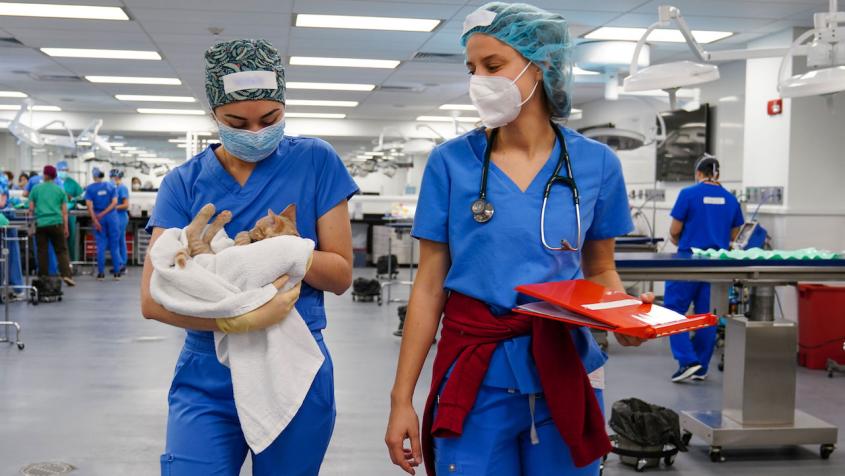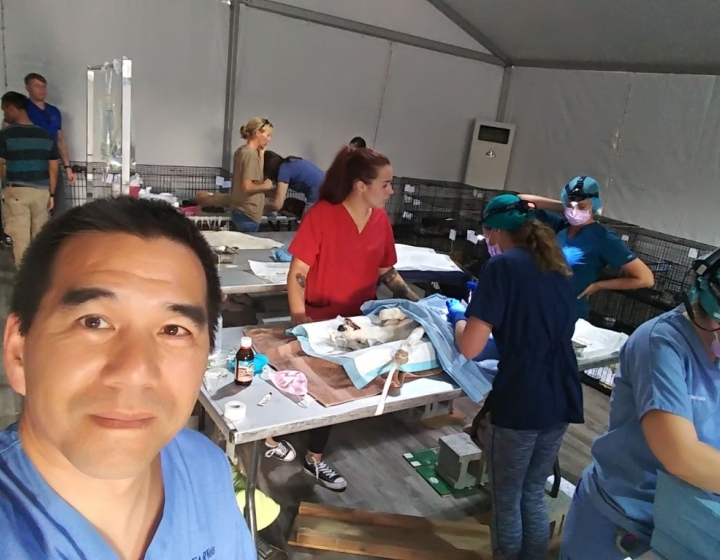Veterinary students lead World Spay Day event for local cats
Students in the College of Veterinary Medicine provided spay-neuter and wellness services for a total of 50 cats from underserved communities in the greater Ithaca area to mark World Spay Day Feb. 12. This was Cornell’s third year participating in the worldwide event.

“It was wonderful to be part of a team that could help cats and people in our community who may have trouble finding these services otherwise,” said Makayla Watros, D.V.M. ’23, one of the students who organized the event.
Spay-neuter surgeries help reduce overpopulation among cats, while wellness services, like vaccines and flea medication, generally increase an animal’s quality of life. Maddie’s® Shelter Medicine Program at Cornell worked with other veterinary volunteers to oversee the event and guide students. Including the seven organizers, 14 students performed anesthesia, 10 did surgeries, eight volunteered to receive the patients and another eight helped the cats recover afterward.
“There is a huge need for increased access to spay-neuter services for cats in the community,” said Dr. Erin Henry, assistant clinical professor of shelter medicine.
One unspayed female can produce an additional 12 cats in a year, who themselves will go on to quickly reproduce. Moreover, the going rate for a spay or neuter procedure can be $100 or more. “Families are struggling to get their cats spayed and neutered, whether due to finances stretched thin by the pandemic or scheduling with veterinary clinics that are booked for months,” Henry said.

The student organizers included Sophie Bracken, Claudia Guinansaca-Aguilar, Yinghui Qui, Katie Trail, Makayla Watros, Anna Young and Marissa Zerkowski, all members of the D.V.M. Class of 2023. World Spay Day is a campaign of the Humane Society Veterinary Medical Association. It’s held every February, which is Spay-Neuter Awareness Month. Veterinary professionals can participate in a variety of ways, commonly through clinics like Cornell’s. Such offerings are in high demand, with registration typically filling up within hours.
“We had an overwhelming number of responses from members of the community needing help with their cats,” said student organizer Anna Young, D.V.M. ’23. “Our slots were filled in less than a day. I only wish we could have helped more!”
Young had participated in spay-neuter clinics before, but this was her first time helping run one herself. “I wanted to be part of a group working on an important project that will affect many lives, both human and animal,” she said.

Students honing skills
Events like World Spay Day combine a vital service to the community with meaningful training for Cornell’s veterinary students. “It is so important for students to gain hands-on experience in all aspects of surgery,” Henry said. This includes obtaining a history and client consent prior to surgery, conducting pre-anesthetic exams, administering anesthesia, performing the surgery itself, and following through with patient recovery and discharge.

“Having opportunities like this, where students reinforce skills repeatedly over multiple cases in a single day, is essential to building both confident and competent future veterinarians,” Henry said.
Watros helped coordinate inventory leading up to the event, and led the recovery team for the cats after their spay-neuter procedure. Her team was in charge of waking up the patients after surgery, as well as administering their vaccines, microchips and tick/flea prevention medication. Once the cats were awake and back in their carriers, the recovery team also fed them wet food to help them feel better after a day of fasting.
“I learned how important the role of recovery is,” Watros added. “If a patient has an anesthetic complication, it will likely happen in recovery or induction. Fortunately, we had a wonderful team of volunteers and shelter medicine interns recovering the cats.”
Young also helped with recovery of the cats after surgery, and co-led the intake and discharge component alongside fellow student organizer Katie Trail, D.V.M. ’23.

“I spent a lot of time making sure things stayed organized, including ensuring the correct paperwork went with the right cat, and that we’d documented everything we had done for each animal,” Young said.
“I learned a lot about communicating with owners, organizing records, delegating tasks and generally just how much thought and work goes into planning a high-volume clinic, down to the smallest details,” Trail said. The best part of Trail’s day was seeing how happy the owners were to have access to care for their cats. “Some were multi-cat households afraid of having kittens, or were struggling with spraying and other behaviors that can be reduced by neutering,” she said. “It was wonderful to see that we were making a difference and supporting the bond between these cats and their owners.”

For Young, it was meaningful to be able to speak directly to owners about their animals. “The most valuable part was being able to help people in need,” she said, “and knowing that the cat population in and around Ithaca will be that much healthier because of what we did.”
The shelter medicine group plans to participate in World Spay Day again next year, and will continue to provide high volume, high quality spay-neuter services through its regular community programming. This event was made possible by Maddie’s® Shelter Medicine Program and the Humane Society Veterinary Medical Association.

Written by Melanie Greaver Cordova






